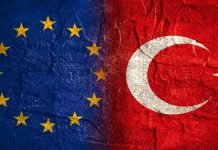The European Parliament has voted to propose the formal suspension of accession talks with Turkey, with members of the European Parliament saying the relations between Turkey and the European Union were at a “historic low point,” Turkish Minute reported.
EU-Turkey relations have deteriorated to such an extent that the EU needs to profoundly reassess them, the MEPs said in the report adopted on Wednesday.
The report was passed by 480 votes in favor, 64 against and 150 abstentions.
Rapporteur Nacho Sánchez Amor said the report was “probably the toughest yet in its criticism of the situation in Turkey.
“It reflects all that has unfortunately happened in the country in the last two years, in particular in the fields of human rights and rule of law, which remain the main concern for the European Parliament, and in its relations towards the EU and its members,” he added.
In recent years the government of Turkey has increasingly distanced itself from EU values and standards. As a result, relations have been brought to a historic low point, warned the MEPs, who are particularly concerned about the state of the rule of law and respect for fundamental rights.
In the report adopted on Wednesday, they insisted that if Turkey does not reverse this current negative trend, the EU Commission should recommend that the accession negotiations be formally suspended.
Criticizing Turkey’s regressive institutional reforms, the MEPs are alarmed by the “authoritarian interpretation of the presidential system,” pointing to the lack of independence of the judiciary and “continued hyper-centralization of power in the presidency.”
Through a referendum in April 2017, Turkey switched from a parliamentary system of governance to an executive presidential system that granted President Recep Tayyip Erdoğan and his ruling Justice and Development Party (AKP) sweeping powers and was criticized for removing constitutional checks and balances, thus leading to a further weakening of Turkish democracy.
The MEPs also called on Turkey’s relevant authorities to release all imprisoned human rights defenders, journalists, lawyers, academics and others who have been detained by the government on unsubstantiated charges.
The Turkish government launched a massive crackdown on non-loyalist citizens following a failed coup attempt in July 2016 under the pretext of an anti-coup fight.
The MEPs also voiced concerns about Turkey’s “hostile” foreign policy, including towards Greece and Cyprus, as well its involvement in Syria, Libya and Nagorno-Karabakh, which they said consistently collides with the EU’s priorities.
They also repeated their call to Turkey to recognize the mass killings of Armenians during World War I as genocide, which they said would pave the way for a genuine reconciliation between the Turkish and Armenian peoples.
Turkey categorically rejects the killings as genocide.
Turkey’s relations with the EU date back to 1963. The country was named a candidate in 1999, and negotiations for full membership started in 2005. The EU has suspended talks with Turkey due to the EU’s unhappiness with what the union has described as a decline of democratic norms in the country.














